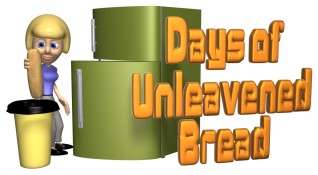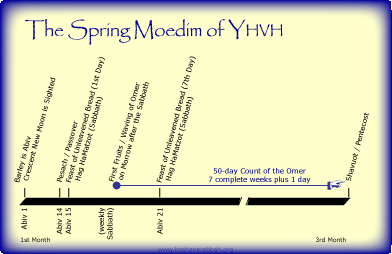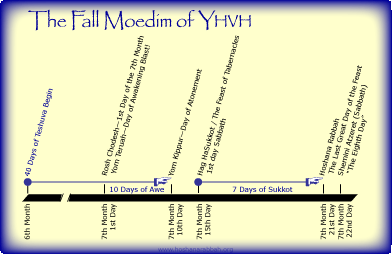Leviticus 23:2, Feasts. These feast (moedim) days are set-apart times for YHVH’s consecrated people. They are divine appointments between the Creator of the Universe and his called-out ones. Furthermore, they are love feasts (Jude 12) between YHVH-Yeshua and his bride, the saints of the Most High Elohim. The seven feasts of YHVH are the perfect seven-step divine plan showing how YHVH-Yeshua will redeem his backslid people Israel, his adulterous bride, back to himself. These days are the embodiment of the gospel (the good news) message of the coming marriage between Yeshua and his bride and the establishment of his kingdom upon this earth in a full and universal sense! We show our belief, faith, love, anticipation and obedience to him by walking them out.
To not set aside time for them from one’s secular schedule is to ignore the call of the Bridegroom, Yeshua, for us to go out to meet him. It is to deprive oneself of the joys of communing with the Set-Apart (Kadosh) One of Israel in this special and set-apart way. It is to disregard and treat as common and profane the consecrated times that YHVH established for him and his people to come together. It is to disregard the covenants, the national constitution and marriage agreement between YHVH and his people—redeemed Israelite believers who have been grafted in to the olive tree of Israel through a relationship with Yeshua, the Messiah, the Anointed Sent One of Israel (Rom 11:13–24; Eph 2:11–19). To disregard YHVH’s feast days is to show disregard for his Torah-commands—his precepts, teachings and instructions in righteousness. To do this is to violate his commandments, which is sin (1 John 3:4)!
The Feasts Represent the Seven Steps of YHVH’s Plan of Salvation For Mankind (in more detail)
Passover (Pesach): The first annual festival in YHVH’s glorious lineup in the steps of redemption is Pesach which occurs in the early spring of the year at the time of the rebirth of the creation after a long and dead winter season. Likewise, it was the time of the birth of the nation of Israel. The Children of Israel had been enslaved in Egypt for many years, but they could not extricate themselves from the death grip of Pharaoh, a picture of Satan, without some help from above. YHVH heard their cries of anguish, told them to sacrifice a lamb and smear the blood on the doors of their homes. This they did by faith. YHVH extended his grace and mercy upon them, caused the angel of YHVH to pass over their homes so that they were delivered from the wages of their sins which is death. At the same time, the Egyptians received judgment unto death because they were not under the blood of the lamb. Israel was now free to leave Egypt. Spiritually one must leave the world (spiritual Egypt), a place of spiritual oppression and slavery, darkness and false religion. It is the realm or kingdom of Satan, the prince of death. One cannot leave the kingdom of darkness on one’s own strength. One cannot free oneself from slavery to the strong tyrants and masters of this world, the flesh or the devil. Continue reading →







